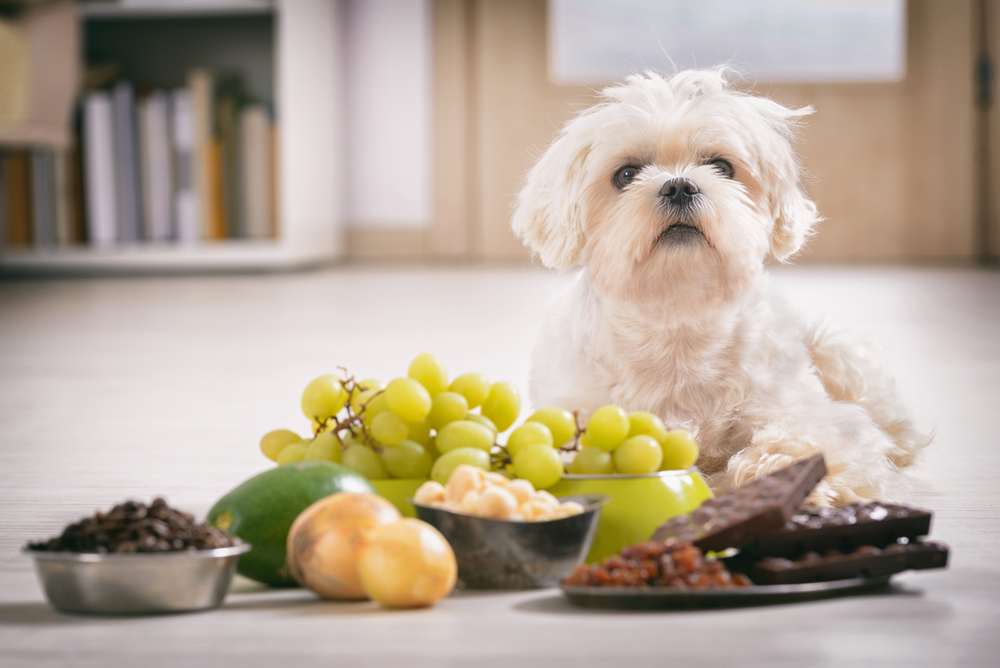The word toxic comes from the ancient Greek word toxikon, meaning “poison for arrows.” While swallowing poison darts rarely occurs among pets, here’s a list of foods that are dangerous to share with our best friends with four legs or feathers.
Alcohol: Letting or encouraging pets to drink alcohol is dangerous. We know grapes are harmful to dogs, but what we don’t know is whether wine (made from grapes) creates an additional worry. Likely a few sips of beer is no big deal, but videotaping your pet drinking for Instagram isn’t worth the risk.
Apricots/Peaches: Apricot and peach plants contain small amounts of cyanide. One munch from the stem or plant itself is likely not harmful, but as with anything, too much can cause a problem. A bite or two of cut-up apricot or peach is a healthy snack for dogs, but the pits contain cyanide and may be a choking hazard or cause an obstruction requiring surgery.
Avocado: This fruit contains a toxin called persin, but only certain animals are affected, notably pet birds. So never feed guacamole to your feathered friends. Dogs and cats are rarely affected by persin, but avocado pits can be choking or obstruction hazards, so keep them away from pets.
Caffeine (found in coffee, tea, soda, energy drinks): There aren’t too many dogs or cats requesting that pick-me-up in the morning, and ferrets rarely require any pick-me-up, which is a good thing because caffeine can be deadly to these species, all highly sensitive to its effects. When it comes to ferrets, in particular, just a few sips can be dangerous. A Great Dane may be able to handle drinking some coffee or tea, but why would you give it? If you have a curious or “eat-it-all” pet, keep tea bags, coffee beans, and chocolate-covered espresso beans well out of reach.
Chocolate: Cats and dogs are both at risk of chocolate poisoning, although most cats, thought to lack taste receptors for sweetness, would probably rather play with M&Ms than eat them. Smaller dogs face greater risk of chocolate toxicity than large dogs because it takes less chocolate to negatively affect them. While three ounces of milk chocolate can cause vomiting and diarrhea in a 20-pound dog, it takes about 11 ounces to cause the same effects in an 80-pound dog. Of course, there’s variability depending on the dog. And we know that while dark chocolate is healthier for humans, it contains more of the chemical theobromine, the element that’s toxic to pets.
Garlic and Onions: This is a confusing one, because there is some documentation that garlic in very small amounts is healthful. But garlic, along with onions, chives, and leeks, belongs to the Allium family, which is toxic to dogs and cats. What’s more, specific breeds are more sensitive, including Japanese dog breeds such as Akitas and Shiba Inus. Cats appear to be more sensitive than dogs. Toxic doses of garlic or other alliums can damage red blood cells, making them more likely to rupture and lead to anemia. Gastrointestinal upset can occur or even death. Adding to the confusion, signs of garlic poisoning may not become apparent for several days. Garlic may also cause illness in pet birds and small mammals such as rabbits and ferrets. Note that many products we think harmless, such as tomato sauces, may contain garlic, onions, leeks, or chives.
Grapes/Raisins: Though research has yet to pinpoint exactly which substance in fresh or dried grapes causes the problem, grapes and raisins are highly toxic to dogs, cats and ferrets, causing sudden kidney failure. Avoid giving them as treats.
Macadamia Nuts: Dogs may be the only species susceptible to macadamia nut toxicity. It’s a mystery as to why macadamia nuts are toxic to dogs as well as why some dogs suffer signs that may include any combination of being in a trance-like state, fainting, vomiting, or tremors that may disappear without treatment, while other dogs require veterinary intervention.
Mustard: Never feed pets mustard seeds. They contain toxic compounds, and even a small amount may be harmful. Yellow mustard in small amounts is unlikely to be an issue, but ingesting too much can lead to vomiting, depending on the dog’s size and individual sensitivity, so it’s best to avoid sharing that pastrami sandwich with your pet. Mustard greens may also cause severe stomach upset. If you want to share mustard greens with your dog, steam until tender and serve unseasoned.
Xylitol: This artificial sweetener is extremely toxic to dogs, cats, and many other pet species. Even small amounts of Xylitol will cause hypoglycemia (low blood sugar), seizures, liver failure, even death. Xylitol can be found as a sugar substitute in baked goods such as brownies; chewing gum; toothpaste (a reason to use only pet-safe toothpaste); and children’s vitamins. While peanut butter is generally a fun treat for dogs, be aware that some sugarless brands contain Xylitol.
This article was reviewed/edited by board-certified veterinary behaviorist Dr. Kenneth Martin and/or veterinary technician specialist in behavior Debbie Martin, LVT.








